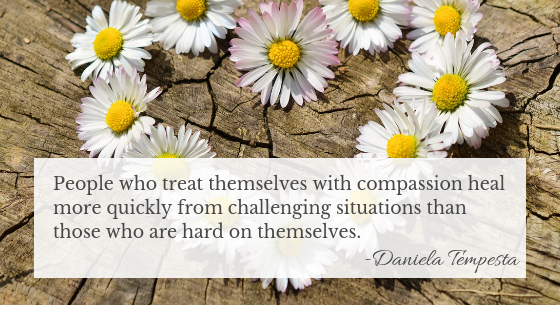How do you relate to a friend in pain?
With empathy and warmth, right?
Strangely, this is not usually how we treat ourselves when we are the one who’s struggling. Instead, we are usually total jerks to ourselves, treating ourselves in ways we’d never think of treating someone we care about. This just serves to worsen our predicament because it increases our suffering and makes it more difficult to bounce back.
Psychological research has consistently shown that people who are more compassionate toward themselves, accepting reality without judgment, experience improved self-worth, increased feelings of joy, and decreased levels of anxiety. Additionally, self-criticism and feelings of shame are major predictors for anxiety and depression.
With these powerful facts in mind, let’s think about how you can use self-compassion to take better care of yourself during moments of struggle so you can recover more quickly and effectively.
What to Say To Yourself When You’re in Pain
While it may feel awkward, it is essential to say the same compassionate words to ourselves that we would say to someone else in pain.
Take a moment right now to ask yourself what you might say to a friend who is struggling. Perhaps you would say, “I am so sorry you are having this painful experience right now,” “I know this is a very difficult time for you,” “I am here for you,” or “You will get through this.”
While it may seem silly to say such things to yourself, it is essential that you treat yourself with kindness if you want to recover and move on. Research validates that people who treat themselves with compassion have more psychological resilience and heal more quickly from challenging situations than those who are hard on themselves.
Create Your Own Mantra
In addition to channeling the kind words that you might offer to a friend in pain, Kristen Neff, leading self-compassion researcher, suggests that you develop a personal self-compassion mantra that you can lean on when you find yourself buried in self-criticism or flooded with painful emotions. In her book “Self-Compassion,” she suggests creating a mantra based on these three components:
- acknowledging your pain
- recognizing that suffering is a part of the human experience that we all must endure, and
- offering words of kindness to yourself.
An example might be, “This is really painful right now, but I realize that I am not alone in my suffering. May I be loving towards myself and accept myself just the way I am.” Be sure to make it something that is easily memorized, so you can easily recall it in even the most difficult of moments.
So remember, when painful thoughts, emotions, or experiences arise, don’t make things worse by being hard on yourself. Instead try being compassionate, even if it feels weird or uncomfortable, and see what happens.
Be well,
Daniela
For a helpful guided meditation on tolerating difficult emotions with compassion, click here.





